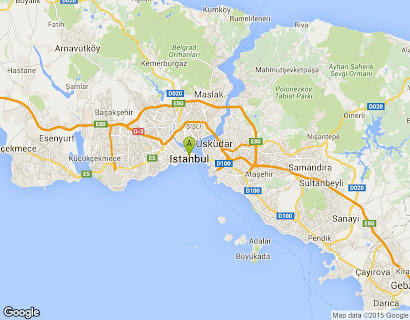//Ed. note: This story relates the 1908 return
to Istanbul of an Ottoman citizen held in
exile in the wilds of Kurdistan and the deserts
of Arabia for 14 years, after the declaration
of 'Meşrutiyet' (constitutional government),
which preceded the fall in 1909 of Sultan
Abdühamid II.
The account was published in the Istanbul
journal 'Yadigar-ı Hürriyet' in 1908. Navy
Navy Lt. Nureddin Tevfik, whose name
appears at the end of the essay, may be
the author, although the title indicates
that the story belongs to his friend.
In the text, when the citizen is taken away
from his home to exile, his handlers ask
for 'Vecdi Bey', adding to the confusion
about the identity of the actual exile victim. //
Sultan Abdülhamid II
Navy Lieutenant Nureddin Tevfik. Return from Exile. From my
Friend's Diary.
Sometimes, in my most excruciating moments, I was so distraught
that I wanted to tear up my heart, which was screaming with despair,
and it was all I could do to hold myself back from suicide, within the
despotic world of bloody torture I found myself tumbling around in.
It all began after I came home exhausted from a long day at work,
sensing some impending doom. That freezing Sunday in the year
1310 (1894) there was a misty air of approaching calamity within
my entire household. As I held my angelic child in an embrace my
arms shuddered with anxiety. It seemed as though all of our spirits
desperately felt the need to cry.
Suddenly, there was a knock at the door:
--have Vecdi Bey come here.
Hearing this, I came down to the door in a nervous state and said:
--what do you want?
--please get dressed and come with us. They want to see you for a bit.
After assuring my household that there was nothing to be concerned
about, I was put into the ominous-looking vehicle at the corner. I left
my home behind and felt as if I was heading straight for some hellish
encounter. Three days later, accompanied by a couple of despotic
agents I was put aboard a ship and looked longingly at my
neighborhood one last time, as I headed for some unknown destination.
And without my diary, my boon companion, in which I wrote 'gazel'
(poems) to soothe my soul.
We passed by Sarayburnu and I felt sure this would be the last time I
would see the city I was born and raised in. Pale and shaking, I was
brought down into the hold of the ship. A very rough voyage ensued,
during which I felt like I was hallucinating, thinking of my child, my
mother and my late father, who had disappeared somewhere, as well.
A year and a half earlier, one day when I came home, my heartbroken
mother, 55-years-old, had tried to hide the anxiety she felt but I
pressed her to explain. She lamented that both Behçet Bey and my
late father had been taken away, but to where no one knew. It seemed
that my mother sensed that she would lose another child soon, which
shook me up quite a bit. Two days later, because of my close
acquaintance with Behçet Bey, I was apprehended and subjected to
brutal interrogation for 28 days, after which I was released.
Nonetheless, I felt that those days were a harbinger of what was to
come, so I wrote a long 'gazel' (poem) in my notebook to express my
feelings of oppression. And exactly one and a half years later, I was
packed off, foaming at the mouth like Behçet Bey, nothing more
than a desperate criminal, dragged across the high seas, until our
ship docked at İskenderun.

İskenderun is directly northeast of Cyprus's northeastern
peninsula.
//END of PART ONE//



